
Build (building)
You may build on your turn after you have rolled for resource production and finished trading.
To build, you must turn in the specified combinations of Resource Cards (see the Building Costs Cards).
Return the Resource Cards to the supply stacks.
You can build as many items and buy as many cards as you desire, as long as you have enough resources to pay for them and they are still available in the supply. (See Settlements, Cities, Roads, and Development Cards).
Each player has a supply of 15 roads, 5 settlements, and 4 cities. If you build a city, return the settlement to your supply.
Roads and cities, however, remain on the board until the end of the game once they are built.
Your turn is over after "building", and the player to your left continues the game.
Building Cost Cards
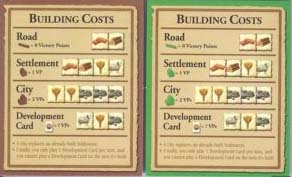
The Building Costs Cards show what can be built and which resources are required. When you pay building costs, you must return the necessary resources to their supply stacks.
You can build settlements and roads, upgrade settlements to cities, and buy Development Cards.
Cities
You cannot build a city.
You can only upgrade an existing settlement to a city. You pay the required resources, return the settlement to your supply, and replace the settlement with a city on the same intersection.
Each city is worth 2 victory points. You receive double resource production (2 Resource Cards) from the adjacent terrain hexes whenever those numbers are rolled.
When you build a city, the upgraded settlement piece becomes available again. You can build more settlements later.
Hint: It is extremely difficult to win the game without upgrading settlements into cities. Since you only have 5 settlements available, you can only reach 5 victory points by only building settlements.
Coast
When a terrain hex borders on the sea, it is called a "coast".
You can build a road along a coast.
You can build settlements and upgrade settlements to cities on intersections that border on the sea.
Coastal sites often lie on harbors, which allow you to use maritime trade to trade resources at more favorable rates.
Desert
The desert is the only terrain hex that does not produce resources.
The robber is native to the desert, and he starts the game there.
A settlement or a city built adjacent to the desert yields fewer resources than than those built next to one of the other terrain types.
Development Cards
There are 3 different kinds of Development Cards: Knights, Progress, and Victory Points.
When you buy a Development Card, take the top card of the draw stack into your hand.
Keep your Development Cards hidden until you play them. This keeps the other players in the dark.
You cannot trade or give away Development Cards.
You may only play 1 Development Card during your turn either 1 Knight Card or 1 Progress Card.
You can play the card at any time, even before you roll the dice.
You may not play a card that you bought during the same turn.
You only reveal Victory Point Cards when the game is over once you or an opponent reaches 10+ victory points and declares victory.
Harbors
Harbors allow you to trade resources more favorably.
In order to control a harbor, you must build a settlement on a coastal intersection which borders the harbor.
Intersections
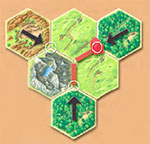
Intersections are the points where 3 hexes meet.
You may only build settlements on intersections.
The influence (for resource yields) of settlements and cities extends into the 3 adjacent terrain hexes that form the intersection.
Largest Army
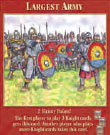
If you are the first player to play 3 Knight Cards, you receive this Special Card, which is worth 2 victory points.
You place the "Largest Army" card face up in front of you.
If another player plays more Knight Cards than you have, he immediately takes the Special Card.
The 2 victory points likewise count for the new owner.
Longest Road
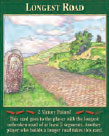
If you are the first player to build a continuous road of at least 5 individual road pieces, you take this Special Card and place it face up in front of you.
This card is worth 2 victory points.
If you hold the "Longest Road" card and another player builds a longer road, he immediately acquires your "Longest Road" card. He also acquires the 2 bonus victory points.
You can break an opponent's road by building a settlement on an open intersection along his road!
Set the "Longest Road" card aside if (after a longest road is broken) several players tie for the new longest road or no one has a 5+ segment road.
The "Longest Road" card comes into play again when only 1 player has the longest road (of at least 5 road pieces).
Note: If your road network branches, you may only count the single longest branch for purposes of the longest road.
Paths

Paths are defined as the edges where two hexes meet.
Paths run along the border of two terrain hexes or between a land hex and the frame.
Only one road can be built on any path.
Each path leads to an intersection where 3 hexes meet.
Progress Cards
Progress Cards are a type of Development Card. They have green frames. There are 2 each of 3 varieties:>
Road Building: If you play this card, you may immediately place 2 free roads on the board (according to normal building rules).
Year of Plenty: If you play this card you may immediately take any 2 Resource Cards from the supply stacks. You may use these cards to build in the same turn.
Monopoly: If you play this card, you must name 1 type of resource. All the other players must give you all of the Resource Cards of this type that they have in their hands. If an opponent does not have a Resource Card of the specified type, he does not have to give you anything.
You may play only 1 Development Card during your turn.
Resource Cards
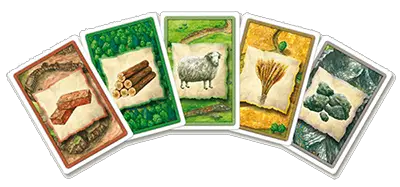
-
There are 5 different types of resources:
- grain (from fields)
- brick (from hills)
- ore (from mountains)
- lumber (from forest)
- wool (from pasture)
-
You receive these cards as income from the resource production of these hexes.
-
Resource production is determined by the dice roll at the beginning of each turn.
-
You receive your income for each terrain hex adjacent to your settlements or cities every time the production number on the hex is rolled.
Resource Production
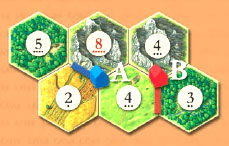
On your turn, you must roll the dice for the turn's resource production.
The number rolled determines which hexes produce resources.
Each number appears twice (except for 2 and 12, which only appear once).
All players who have settlements or cities on the hexes indicated by the roll receive the yields of those hexes.
Each settlement produces 1 Resource Card.
Each city produces 2 Resource Cards.
It is possible that during the game there will not be enough resources in the bank to supply all of the yields.
If there are not enough Resource Cards to give every player all the production they earn, then no player receives any of that resource that turn.
Production of other types of resources is not affected.
Roads
The roads connect your settlements and cities.
You build roads on paths.
You cannot build new settlements without also building roads.
Roads provide victory points only if you hold the Longest Road Special Card.
Only 1 road may be built on each path.
You can build roads along the coast.
Robber
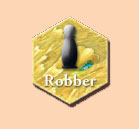
The robber begins the game in the desert. It is moved only by rolling a 7 or playing a Knight Card.
If the robber is moved to any other terrain hex, he prevents that hex from producing resources.
Players with settlements and/or cities adjacent to the target terrain hex receive no resources from this hex as long as the robber is in the hex.
Settlements
-
A settlement is worth 1 victory point.
-
Settlements are built on intersections (where 3 hexes meet).
-
You share in all of the resource production of each terrain hex adjacent to your settlements.
-
You must meet 2 conditions when building a settlement:
- Your settlement must always connect to 1 or more of your own roads.
- You must observe the Distance Rule.
Note: If you have built all 5 of your settlements, you must upgrade 1 of your settlements to a city before you can build another settlement.
You will then have the settlement in your supply, so you can build another settlement.
Victory Point Cards
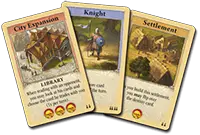
Victory Point Cards are yellow frame Development Cards, so they can be "bought".
These Development Cards represent important cultural achievements, represented by certain buildings.
Each Victory Point Card is worth 1 victory point.
You only reveal your Victory Point Cards when you or someone else wins the game!
Keep Victory Point Cards hidden until you have 10 points during your turn and you can declare victory. (You should also reveal them if someone else wins).
Hint: Again, keep your Victory Point Cards hidden until the end of the game. Place them face down in front of you.
Of course, if you have 1 or 2 unused cards face down in front of you for a long time, the other players will assume that they are Victory Point Cards.
Victory Points
-
The first player to reach (be at) 10 victory points on his turn wins the game.
-
Players acquire victory points (VPs) for the following:
- 1 Settlement = 1 VP
- 1 City = 2 VPs
- Longest Road Special Card = 2 VPs
- Largest Army Special Card = 2 VPs
- Victory Point Card = 1 VP
-
Since each player begins with 2 settlements, each player begins the game with 2 victory points.
-
Therefore, you only need 8 more victory points to win the game!
Continue Reading


